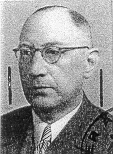
| Born: | 02-10-1888 |
| Faculty: | Philosophical School |
| Category: | Deprivation of academic degree |
Eduard MICHL, born on February 10th, 1888 in Tarvis/Carinthia [Tarvisio/Italy] (entiteled residency ("heimatberechtigt") for Vienna, citizenship 1938: Austria), lived in Vienna's 3rd district, Ungargasse 71. He attended the k.k. Theresianische Akademie in Vienna and later the k.k. Staatsgymnasium in Vienna's 3rd district where on July 5th, 1907, he also successfully passed the school-leaving examination (Reifepruefung/Matura) and was enrolled at the Philosophical School from the fall term of 1907/08 to the spring term of 1911, studying "descriptive natural sciences" and taking courses in zoology and botany.
During his studies he worked experimentally at the Biological Experimental Station "Vivarium" of the Austrian Academy of Sciences in the Prater on "Growth Curves of Animal Blendlings" and later also at the k.k. Naturhistorisches Hofmuseum, where he took special colloquia from zoology and practical exercises and where he was also assigned to revise a Palaearctic Dipterengenus. He began his dissertation "On the ventral gill remnant of anurans" in the 3rd year of his studies at the Embryological Institute under Prof. Dr. H. Rahl (supervisors: Hatschek, Grobben), and on February 28th, 1912, he obtained the degree of "Dr. phil." in zoology.
Subsequently, he completed his military service in 1912/13 in the Feldhaubitzen-Division II/3 in Pressburg [Bratislava] and was active from 1913 as an assistant at the embryological institute of the University of Vienna, in the First World War from 1914-1918 as a soldier at the Russian and the Italian front (disarmed as Oberleutnant d. R.), and also afterwards again as an assistant.
From 1920 to 1925 he studied medicine and received his medical doctorate on December 14th, 1925 ("Dr.med.univ."). He also completed his medical training and from 1928 was a general practitioner in Weitra and Gmünd, both in /Lower Austria.
He was politically involved in Austrofascist-monarchist milieus, from 1929 to 1935 he was active in the Niederösterreichischen Heimatschutzverband, first as a district leader ("Bezirksführer") and later as a regional leader ("Gauführer), and was a member of the Vaterländische Front (1935-1938). After the socalled "Anschluss", he was considered "politically unreliable" by the National Socialist regime and was forcibly relocated from Lower Austria to Vienna in April 1938. In Vienna, however, he was able to continue running a medical practice in Vienna's 15th district, Rauchfangkehrergasse 28/14 - until 1940.
He was arrested on April 4th, 1940 for listening to foreign radio stations, treachery and insulting the party uniform. He had listened to banned Hungarian and English radio stations with his brother Eduard and made derogatory remarks about the Nazi regime. During a search of his apartment, numerous banned Austrofascist books and writings were also found, as well as large murals of the emperor's son Otto Habsburg, of the Austrofascist chancellor Engelbert Dollfuss and of Heimwehr leader Ernst Rüdiger Graf Starhemberg, and several sheets of propaganda stickers of the Heimatschutz. For this he was sentenced on October 2, 1940 by the Vienna Regional Court as a special court to 2 years in prison (his younger brother Richard to 10 months).
On May 8th, 1941, after his conviction according to § 26 StG, he was deprived of his doctor's degree by a declaratory decision of May 8th, 1941, and on May 14th his license as a physician was also revoked.
After his dismissal he was no longer allowed to work as a doctor, made his living as a scientific assistant in a large pharmaceutical industry in Vienna and soon joined the Viennese group of the Austrian Anti-Fascist Freedom Movement around Dr. Karl Wanner, a monarchist resistance group of former members of the Heimwehr, which was also called the "Lambert Round" after its meeting place in the Café Lambert. Due to a denunciator, the round was uncovered, Eduard Michl was arrested on February 8th, 1943, but was acquitted of the charge of high treason on August 15th, 1944, due to lack of evidence.
He was readmitted to the medical profession in 1945 - without being formally re-awarded his doctorate - and was able to resume his medical practice in Vienna and also became a public health officer and contract physician for the police. However, the fact that in 1946 he "cleared out the ordination of his colleague Dr. Wechtl with revolutionary élan and put himself in possession of a large part of the furnishings" - a kind of "private reparation" because Dr. Wechtl was the former NSDAP district medical leader - did lead to a moderately critical exchange of letters between the president of the Medical Association and the police headquarters. Nevertheless, he was appointed "Medizinalrat" in 1951. He was married to Hedwig Rösler (1886-1967), the marriage remained childless.
Medizinalrat DDr. Eduard Michl died on January 31st, 1957 in the Kaiserin-Elisabeth-Spital in Vienna's 15th district and is buried in the Vienna Central Cemetery.
It took 62 years since the deprivation – and a very long time since the end of Nazism – until the regranting of the doctorate took finally place on April 10th, 2003 posthumously in a solemn ceremony.
Lit.: Archive of the University of Vienna/enrollment forms ("Nationale") PHIL 1907-1912, MED 1920-1925, final examination file and registry ("Rigorosenprotokoll und -akt") PHIL 1622 & 3324, graduation registry ("Promotionsprotokoll") PHIL 1905–1913 No. 1210, graduation registry ("Promotionsprotokoll") MED 1923–1929 No. 1370, Rectorate GZ 1530 ex 1939/40, GZ 140 ex 2002/03, PHIL GZ 24 ex 1941/42; DOeW 5.734a, 19.793/79, 2.062; POSCH/STADLER 2005, 91-92; POSCH 2009, 449; REITER-ZATLOUKAL/SAUER 2023.
Herbert Posch